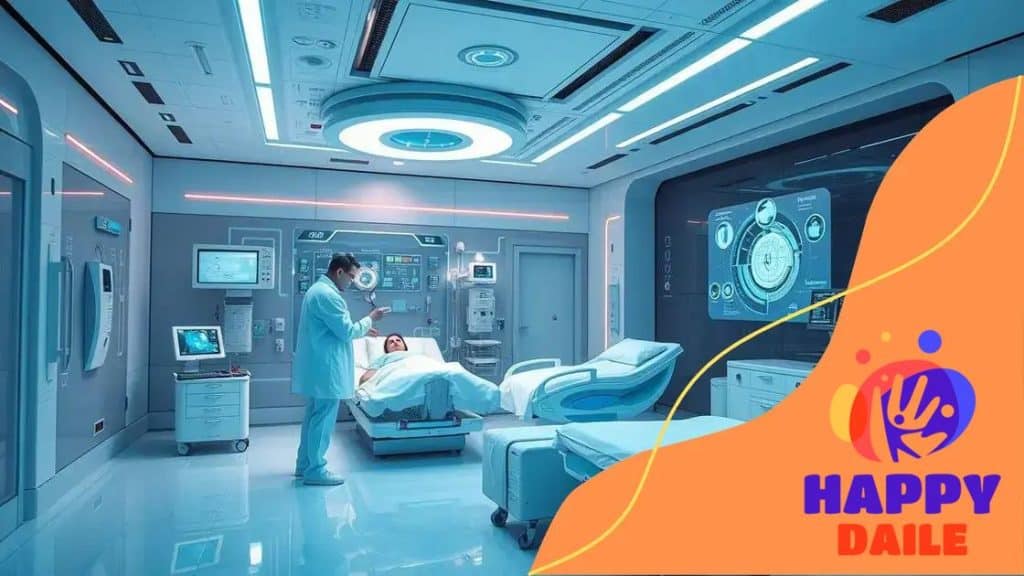The role of 5G technology in healthcare innovation

Anúncios
The role of 5G technology in healthcare innovation enhances telemedicine, enables real-time patient monitoring, improves data management, and fosters advanced medical devices, leading to more efficient and accessible healthcare solutions.
The role of 5G technology in healthcare innovation is becoming increasingly important. Imagine a world where patient care becomes seamless, where doctors can communicate in real-time, and medical data is transferred in an instant. Curious about how this is possible? Let’s dive in!
Anúncios
Understanding 5G technology
Understanding 5G technology is essential as it becomes more prevalent in our lives. 5G is the fifth generation of mobile networks that promises to revolutionize the way we connect and communicate. It brings faster speeds, lower latency, and the ability to connect more devices at once.
With 5G, users can expect download speeds that are substantially higher than those of 4G networks. This means that streaming high-definition videos or downloading large files will be much quicker. Moreover, 5G technology reduces latency, which significantly benefits applications like telemedicine and real-time data analytics.
Key Features of 5G Technology
Some standout features of 5G include:
Anúncios
- Enhanced Data Speeds: Users can enjoy faster uploads and downloads.
- Massive Device Connectivity: 5G can support a vast number of connected devices, beneficial for IoT applications.
- Low Latency: This feature is critical for applications requiring immediate responses, like automated surgeries.
- Improved Reliability: Ensures stable connections even in crowded areas.
5G technology is not just about speed; it fundamentally changes how healthcare is delivered. Hospitals can implement smart devices that monitor patients in real-time, allowing for immediate intervention when necessary. This shift in technology means that healthcare providers can offer better and more efficient care.
As more healthcare providers adopt 5G, we are likely to see innovations that were previously thought impossible. For instance, remote surgeries could become commonplace, enabling specialists to operate from thousands of miles away. Additionally, patient monitoring systems will provide constant updates to doctors, enhancing the decision-making process.
Education and training for healthcare professionals regarding 5G technology will also be crucial. They must understand how to utilize this technology effectively to ensure the best patient outcomes. As we venture deeper into the 5G era, it’s essential that everyone involved in healthcare stays informed and adaptable to these changes.
Transforming telemedicine with 5G
Transforming telemedicine with 5G is a game changer in the healthcare sector. This advanced technology allows doctors to provide better care from a distance. With the power of 5G, healthcare providers can connect with patients in real-time, enhancing the quality of consultations.
One of the most significant advantages of 5G in telemedicine is low latency. This means that there is minimal delay during video consultations. Patients can receive immediate feedback and support, making vital health decisions faster. The experience is almost like being there in person.
Benefits of 5G in Telemedicine
It’s important to recognize how 5G transforms healthcare access:
- Higher Resolution Video: This results in clearer images during consultations, enabling doctors to make better assessments.
- Remote Monitoring: Patients can be monitored continuously through wearable devices, sending data directly to their healthcare providers.
- Expanded Access: Individuals in remote areas can access specialized care without traveling long distances.
- Increased Efficiency: 5G technology allows healthcare systems to handle more patients effectively, reducing waiting times.
The integration of 5G technology means that even complex procedures can be performed remotely. For example, a surgeon could guide a local doctor during a procedure using real-time video feeds. This brings specialized care to regions where it may not be readily available.
Moreover, the data collected through telemedicine platforms can enhance patient outcomes. Healthcare providers can analyze trends and respond proactively to emerging health issues. With 5G, the shift to a more connected, efficient healthcare system is not just a possibility; it’s becoming a reality.
Impact of 5G on medical devices

Impact of 5G on medical devices is transforming how healthcare operates. As 5G networks expand, medical devices become smarter, more efficient, and increasingly connected. This leads to better patient outcomes and more effective healthcare delivery.
One of the most exciting aspects of 5G is its ability to support a vast number of devices at once. Hospitals can utilize various devices, from wearable health monitors to advanced imaging machines, all connected seamlessly. This connectivity enhances overall patient care and allows for continuous monitoring of health conditions.
Benefits of 5G for Medical Devices
The advantages of integrating 5G technology with medical devices are numerous:
- Real-time Data Transfer: Devices can send data instantly to healthcare providers, enabling timely interventions.
- Improved Remote Surgery: Surgeons can perform operations from remote locations using robotic tools connected via 5G.
- Enhanced Patient Monitoring: Wearables can track vital signs continuously, alerting medical staff about any abnormalities.
- Increased Device Interoperability: Different systems can work together more effectively, providing a holistic view of patient health.
With 5G networks, medical devices are no longer limited by bandwidth issues. This leads to improved functionality in machines like MRI scanners, which can transmit high-quality images in real-time. As a result, doctors can make quicker and more accurate diagnoses.
Moreover, the scalability of 5G allows hospitals to adopt new technologies without worrying about outdated infrastructure. With the flexibility that 5G provides, healthcare institutions can innovate continually. Imagine healthcare systems where diagnostics, treatments, and patient interactions are all improved through better connectivity and advanced technology.
Enhancing patient data management
Enhancing patient data management is a crucial aspect of modern healthcare, especially with the rise of 5G technology. Efficient data management ensures that patient information is accurate, accessible, and secure, leading to better health outcomes.
With the ability to connect various devices and systems, 5G allows for real-time data sharing among healthcare providers. This means that doctors can access a patient’s medical history, treatment plans, and health records instantly, regardless of where they are located. Such connectivity transforms how medical teams collaborate and provide care.
Key Features of 5G in Patient Data Management
The impact of 5G on managing patient data includes:
- Improved Data Accuracy: With real-time updates, the risk of data errors decreases significantly.
- Faster Access: Healthcare providers can retrieve patient information in seconds, leading to quicker decision-making.
- Secure Data Transmission: Advanced encryption methods ensure that patient data remains confidential and protected during transfers.
- Enhanced Integration: 5G technology supports seamless integration between different healthcare systems, making data management more efficient.
For example, wearable devices can continuously collect health data, sending it directly to healthcare systems. This means that any unusual readings can trigger alerts, allowing medical professionals to intervene promptly. Patients benefit from more personalized care, as their health is monitored closely and adjustments can be made to treatment plans based on real-time data.
Additionally, 5G networks pave the way for advanced data analytics. Healthcare providers can analyze larger sets of patient data to identify trends and patterns, ultimately improving treatment protocols. This capability is vital for developing new therapies and improving patient care methodologies.
The future of healthcare with 5G
The future of healthcare with 5G is bright and full of promise. As this technology continues to evolve, it will reshape the way we deliver and receive medical care. With its speed and connectivity, 5G has the potential to enhance nearly every aspect of the healthcare system.
One of the most exciting prospects of 5G is its ability to facilitate remote care. Patients in rural or underserved areas can connect with top specialists using high-quality video feeds and real-time data sharing. This accessibility can lead to significant improvements in overall health outcomes and reduce the need for long travel times to see specialists.
Innovations Driven by 5G
As 5G technology integrates into healthcare, we can expect numerous innovations:
- Telehealth Expansion: Patients can receive consultations and support from their homes, making healthcare more accessible.
- Smart Medical Devices: Wearables and home monitoring systems will collect and transmit data seamlessly, keeping healthcare providers informed.
- AI and Machine Learning: Faster data processing speeds will enable advanced algorithms to analyze health data more efficiently, leading to better diagnoses.
- Robotic Surgery Improvements: Surgeons can operate more effectively over long distances with near-zero latency in communications.
Moreover, the data analytics capabilities that come with 5G will allow for deeper insights into patient populations. For instance, healthcare providers can identify trends in disease outbreaks or monitor chronic conditions across large groups of patients. This data-driven approach can lead to proactive healthcare management and tailored treatment plans.
As we embrace the future, training healthcare professionals in new technologies will also be crucial. They must be equipped to use 5G tools effectively. Collaboration between technology developers and healthcare providers can ensure that innovations meet real needs and improve patient care.
FAQ – Questions About 5G Technology in Healthcare
How does 5G improve telemedicine?
5G improves telemedicine by allowing real-time video consultations and faster data sharing, enabling doctors to provide better care remotely.
What are the benefits of 5G for medical devices?
5G supports faster data transfer and connectivity for medical devices, leading to enhanced patient monitoring and accurate diagnostics.
How does 5G impact patient data management?
5G enhances patient data management through real-time updates and secure data transmission, improving accuracy and efficiency.
What innovations can we expect from 5G in healthcare?
We can expect innovations like improved remote surgery, smart medical devices, and advanced data analytics capabilities with 5G.





